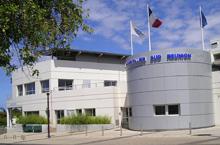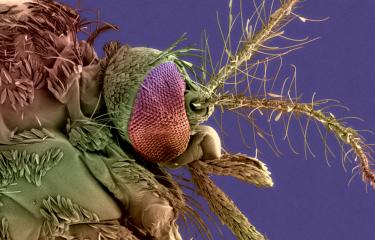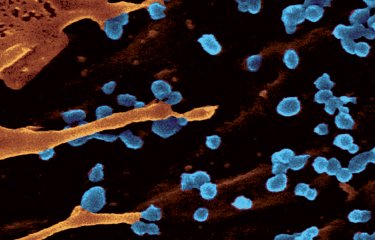During a vast prospective study among pregnant women, clinicians in Reunion and researchers from the Institut Pasteur and Inserm demonstrated for the first time the maternal-fetal transmission of Chikungunya virus. Their findings show that this transmission almost exclusively occurs when mothers are infected shortly before term and that newborns have an increased probability of developing a severe form of the disease.
Press release
Paris, april 18, 2008

In order to explain the onset of the disease in newborns unexposed to bites of the mosquito vectors, GHSR doctors, including Patrick Gérardin, Alain Michault, Georges Barau and Pierre-Yves Robillard, the team of Marc Lecuit1 (Institut Pasteur /Avenir Inserm U604) and Isabelle Schuffenecker (National Arbovirus Reference Centre, Institut Pasteur), rapidly joined forces, in collaboration with other researchers at the Pasteur Institute, to find out if and how mother-to-child transmission of Chikungunya takes place and to determine its incidence, seriousness and mechanism. A vast multidisciplinary prospective study was therefore set up among pregnant women admitted to the GHSR.
Doctors and scientists carried out 22 months of clinical investigations in more than 7,500 pregnant women including 678 who were infected during their pregnancy. They found that the closer to term a mother contracted the infection, the more likely she was to transmit the virus to her child. Hence, although globally less than 3% of children born of mothers who developed Chikungunya during their pregnancy were contaminated, the transmission was almost exclusivel observed when the mother is infected during the two days before childbirth, with a transmission rate reaching 50% in this instance. The study also showed that in one case out of two, children who contracted Chikungunya by maternal-fetal transmission develop a severe form of the disease, with encephalopathy resulting in cerebral oedema in particular, and sometimes haemorrhagic complications.
These results show the importance of follow-up during pregnancy in areas where Chikungunya is endemic and the high probability of transmission of the virus to the infant if the mother is ill during childbirth. They also raise the alarm about the danger of this disease in certain high risk populations such as newborns, and stress that mother-child transmission of the virus should now be taken into account by the public Health Authorities.
_____________________________________________
1 University Professor, Hôpital Necker-Enfants Malades, Université Paris Descartes, Centre d’Infectiologie Necker-Pasteur.
Picture : entrance of the South Reunion Hospital Group./// copyright GHSR.
Sources
« Multidisciplinary Prospective Study of Mother-to-Child Chikungunya Virus Infections on the Island of La Réunion », PLoS Medicine, 18 mars 2008.
Patrick Gérardin, M.D., M.P.H (1,2), Georges Barau, M.D. (1,3), Alain Michault, M.D. (4), Marc Bintner, M.D. (5), Hanitra Randrianaivo, M.D. (6), Ghassan Choker, M.D., Yann Lenglet, M.D. (3), Yasmina Touret, M.D. (3), Anne Bouveret (3), Philippe Grivard (4), M.D., Karin Le Roux, Ph.D. (4), Séverine Blanc, M.D. (5), Isabelle Schuffenecker, M.D., Ph.D. (7), Thérèse Couderc, Ph.D. (8), Fernando Arenzana-Seisdedos, M.D. (9), Ph.D., Marc Lecuit, M.D., Ph.D. (8,10), and Pierre-Yves Robillard, M.D. (1)
(1) Neonatal and Pediatric Intensive Care Unit, Pôle Mère–Enfant, Groupe Hospitalier Sud–Réunion, Saint–Pierre, La Réunion, France
(2) Center of Clinical Investigation–Clinical Epidemiology (CIC-EC, Inserm), Saint-Pierre, La Réunion, France
(3) Department of Gynecology and Obstetrics, Pôle Mère–Enfant, Groupe Hospitalier Sud–Réunion, Saint–Pierre, La Réunion, France
(4) Department of Microbiology, Pôle des Sciences Biologiques, Groupe Hospitalier Sud–Réunion, Saint–Pierre, La Réunion, France
(5) Department of Neuroradiology, Pôle de Radiologie, Groupe Hospitalier Sud–Réunion, Saint–Pierre, La Réunion, France
(6) Fetal Medicine and Fetopathology Unit, Pôle Mère–Enfant, Groupe Hospitalier Sud–Réunion, Saint–Pierre, La Réunion, France
(7) National Reference Center for Arboviruses, Institut Pasteur, Lyon, France
(8) Microorganisms and Host Barriers Group, Institut Pasteur, Paris, France, and Equipe Avenir Inserm U604, Paris, France
(9) Molecular Viral Pathogenesis Unit, Institut Pasteur, Paris, France and Inserm U819, Paris France
(10) Department of Infectious Diseases and Tropical Medicine, Necker-Pasteur Center for Infectious Diseases, Hôpital Necker-Enfants Malades, Paris, France
Contact persons:
Institut Pasteur Press Office
Marion Doucet - + 33 (0)1 45 68 89 28 - marion.doucet@pasteur.fr
Nadine Peyrolo - + 33 (0)1 45 68 81 47 - nadine.peyrolo@pasteur.fr
Inserm Press Office
Anne Mignot - + 33 (0)1 44 23 60 73 – presse@inserm.fr




